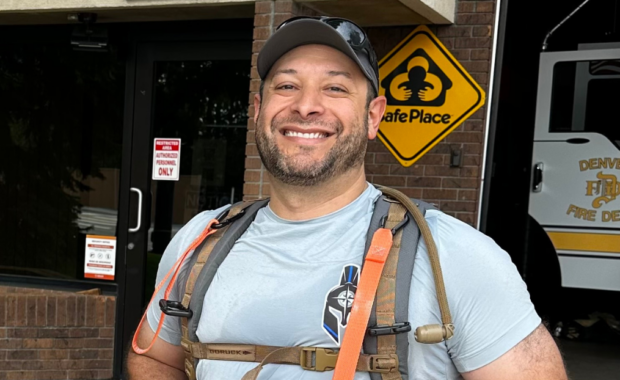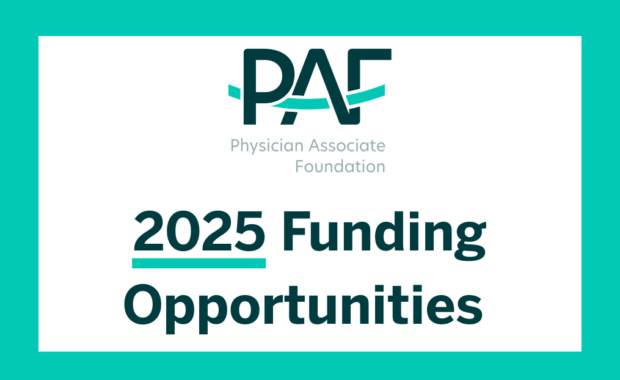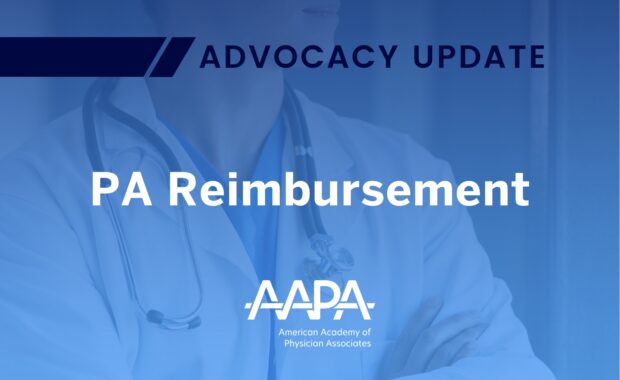How a Childhood in Bosnia Inspired This PA’s Career
Distinguished Fellow Jasmina Salcinovic-Spahic Shares Her Story
May 7, 2022
Dr. Jasmina Salcinovic-Spahic, DMSc, MMSc, MHA, PA-C, DFAAPA, grew up in Zenica, Bosnia and Herzegovina, about 40 miles away from Sarajevo. She was a child during the Bosnian War (April 1992 – December 1995) and her experiences during that time inspired her to become a medical professional. She and her family emigrated to the United States in May 1997. Salcinovic-Spahic has now been a practicing PA for 12 years. She shares her experiences as a child in Bosnia and Herzegovina, her path to becoming a PA, and the dedication she feels to her patients and her profession.
By Jasmina Salcinovic-Spahic, DMSc, MMSc, MHA, PA-C, DFAAPA
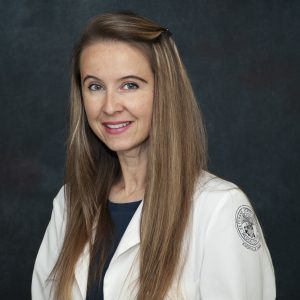
A Childhood in Bosnia
I was 10 years old when the Bosnian War started. We lived in Zenica, not far from Sarajevo, and before the war, our country (Yugoslavia) was strong politically and economically. We spoke Bosnian/Serbo-Croatian at home and school, and learned to read both Cyrillic and Latin alphabets. Both my parents worked, and we often travelled and visited other parts of Europe and Yugoslavia. We lived a good life. When the war started, our lives changed immensely. We went from being a middle-class family to being poor overnight.
1993 and 1994 were especially hard. There were sirens each day. I switched schools every few months, and we children learned to hide and seek shelter whenever we heard sirens announcing bombarding. There was bombarding almost every day. On the radio, we often heard of villages burned down, people killed, and genocide. It was very scary. There was a shortage of medical personnel and supplies in each city. Seeing this, I developed a desire to help people and be in a medical field.
We did not have much food or water. Each day we carried water from the local springs, sometimes several kilometers away. Electricity was off for most days, so we used oil and thread (we didn’t any have candles, because they were too expensive) to have light at night. In the winter, we went to the local forest and my father cut down a tree, which we all dragged to our home, cut it into pieces, and used it to stay warm over the cold winter months.
I remember craving food, and being scared whether or not we would be able to make it through another day. I remember my parents not eating for a few days so my brother and I could have food. I remember going with my mother to knock on other people’s doors, asking for food. It was hard.
[Join Jasmina and other elite PAs as an AAPA Distinguished Fellow.]
Emigrating to the United States
In 1995, through family members, my aunt and uncle were able to obtain VISAs and moved to Atlanta, Georgia. A year later, my aunt was able to send VISAs to my parents. We went through multiple interviews and had to undergo medical exams and lab testing before we were approved to come to United States. The entire process took about 18 months.
In May 1997, I came home from school one day, two weeks before the end of eighth grade. We had received a letter from the American Embassy. We left for the United States two days later.
We arrived in Atlanta on May 23, 1997. We settled in Clarkston, Georgia, where our aunt and uncle lived, as well as many other Bosnian refugees. We started our new life with two bags of belongings. We spoke no English. Local churches and nonprofit organizations helped us with food, and gave us blankets. The first year, even communicating to buy groceries was a struggle. We had a Serbo-Croatian/English dictionary and would memorize words and quiz each other every night after dinner. My father instilled in my brother and me that education was the path to a better life for us. We slept on the floor in our apartment for months, but we were happy to be in a free country, have food, and that we didn’t have to worry about war anymore.
Pursuing Education and a Medical Career
As we settled into life in the U.S., my parents found work and the entire family started learning English. In high school, I threw myself into studies and extracurriculars. I started college locally, in Clarkson, as a pre-med student, then transferred to Georgia State University for my Bachelor of Science in psychology.
While I was an undergrad, I worked part-time at CVS as a pharmacy tech. At the time, my goal was to go to medical school. But one day, as I was counting pills, a physician came by and spoke to the pharmacist I worked with. They discussed their chosen medical careers, and during the conversation, the physician mentioned “PA program.” I overheard his comment and asked: What is a PA program? He explained the profession to me then – that it is fairly new, but gives lots of flexibility to practice in many medical specialties, and that I should look into it. He offered to get me in touch with someone from Emory who could share more about the profession, and I took him up on it.
I shadowed PAs in family practice, dermatology, and orthopaedics. I fell in love with the profession and knew that I wanted to pursue it. I loved the flexibility being a PA offered – I could change specialties as well as locations if I need or wanted to. I applied to Emory’s PA program and was accepted. I remember how happy I was, and I never looked back.
[Wherever you want to go in your career, AAPA can help – join or renew your membership today]
Working as a PA
After I graduated, I moved to Iowa with my husband, who lived there. My first job was in family practice in Chariton, Iowa. I also took call at the emergency department. Over the next few years, I worked in a second emergency department, as well as urgent care clinics. I began working at Veterans Affairs (VA) Central Iowa Health Care in 2013, and have been there since.
During these years, I took advantage of the flexibility of the PA profession. Not only did I move between specialties, I chose to work part time to better balance my work and family life. Between 2011 and 2013, when my two children were young, I worked part time at three different clinics. The PA profession allowed me to do this.
At the VA, I work in Medical Hematology-Oncology. Given my experience with war in Bosnia, I instantly felt connections with my patients – all of them veterans. I have had some of my most meaningful moments seeing these veterans smile as a result of the care I provided to them, in addition to hearing their stories about war and all the places they have visited. Occasionally, some of my patients served in Bosnia during the war, so we have talked about cities and villages they visited, and the foods they like the most. Their military experiences and war stories inspired me, and motivated me to push myself to work even harder, and broaden my knowledge and skills.
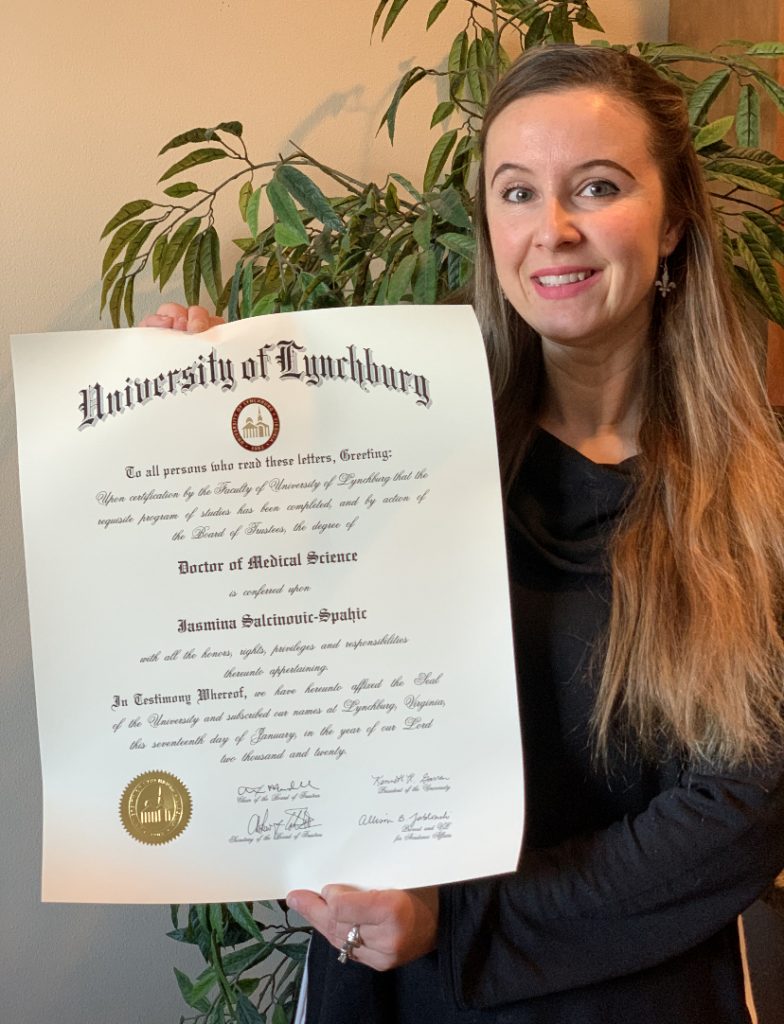
Earning a Distinguished Fellow Designation
As a result, I decided to go back to school, and have completed both a master’s degree in healthcare administration from Des Moines University and a Doctorate of Medical Science from the University of Lynchburg with a fellowship in medical hematology-oncology. In April of 2020, AAPA recognized me with the Distinguished Fellow designation. DFAAPA is one of the most honorable designations that a PA can achieve. It shows a PA’s hard work, character, and perseverance. Receiving the Distinguished Fellow designation gave me even more confidence among my peers and other healthcare professionals. It demonstrates my hard work, continuous learning, love for the profession, and dedication to patient care.
[Earn your Distinguished Fellow designation.]
As a PA, the most rewarding experience for me has been when I see my patients get and feel better as a result of care I provided. Throughout my career, I have worked on helping people understand what PAs can and cannot do under their scope of practice. PAs are trained to be flexible, humble, and a productive part of the healthcare team. The profession is constantly evolving and expanding – that is the beauty of being a PA.
To anyone who is considering becoming a PA, I say: Go for it! The PA profession is so rewarding in many different ways. PAs tend to have more flexibility in regard to both the specialties they want to practice throughout their career and when it comes to work/life balance. Throughout my career, I’ve tried to remember: Never give up, always keep learning, and expand knowledge and skills as much as possible.
Dr. Jasmina Salcinovic-Spahic, DMSc, MMSc, MHA, PA-C, DFAAPA works in Medical Hematology-Oncology at VA Central Iowa Health Care System in Des Moines, Iowa. She can be reached at [email protected].
Originally published January 8, 2021
Thank you for reading AAPA’s News Central
You have 2 articles left this month. Create a free account to read more stories, or become a member for more access to exclusive benefits! Already have an account? Log in.
